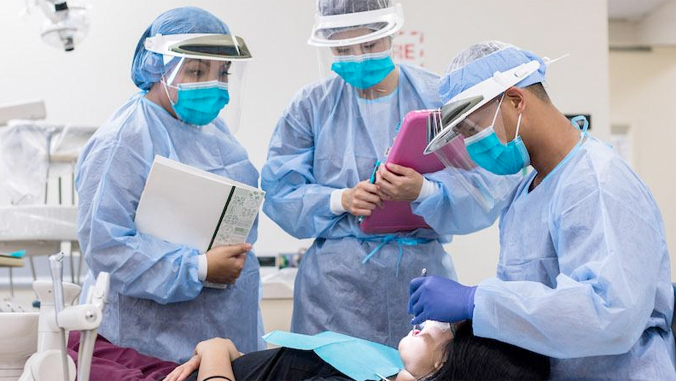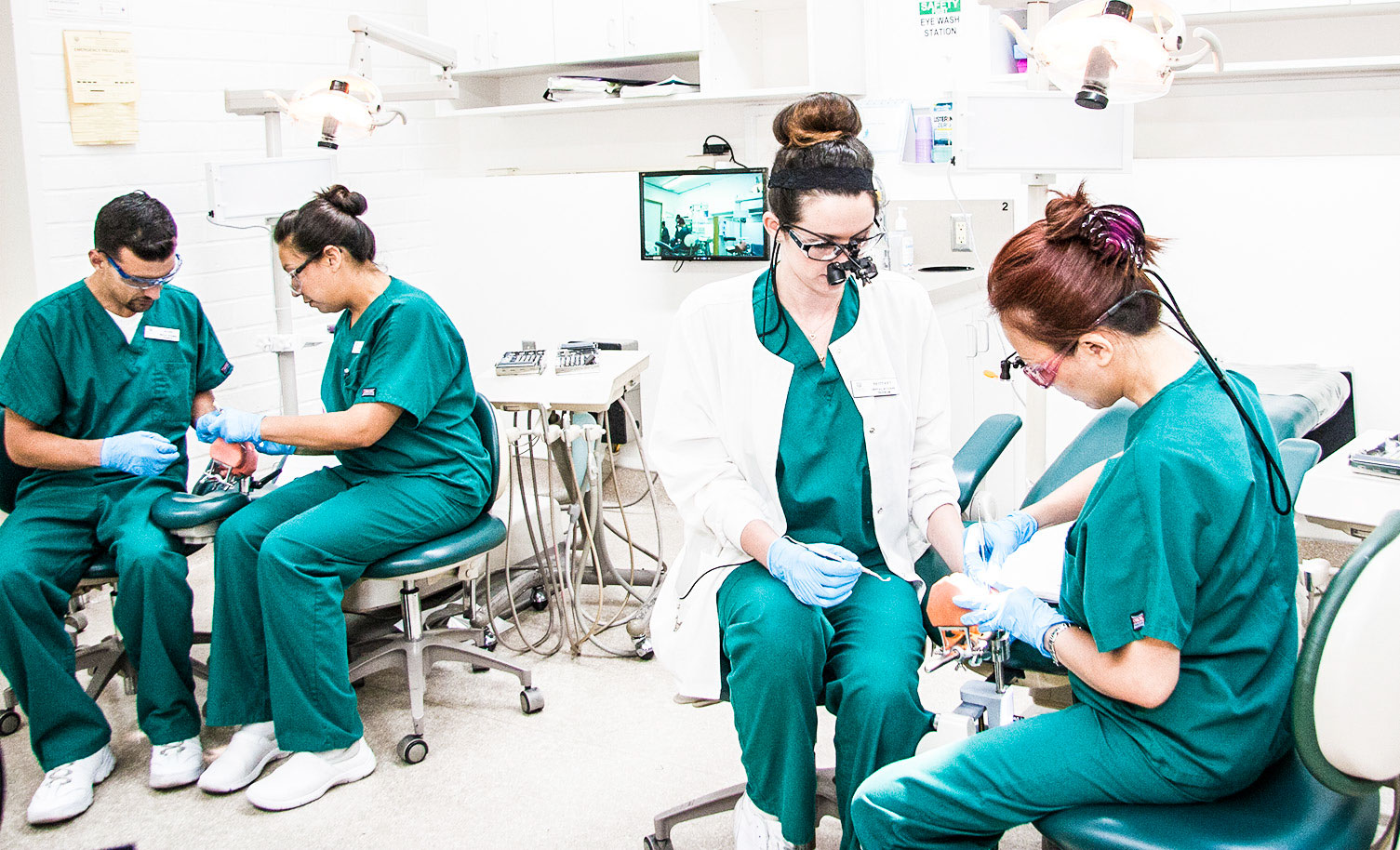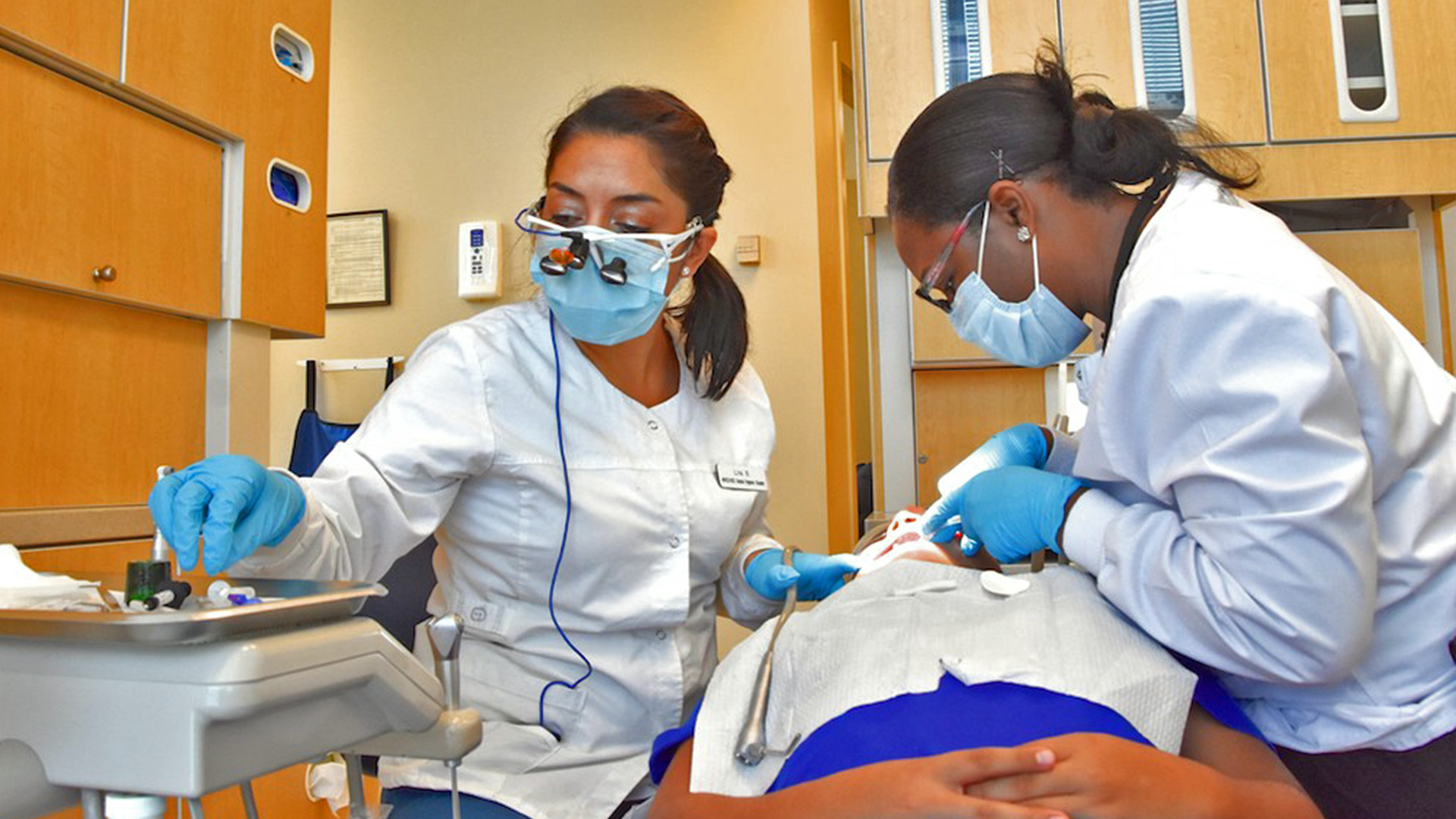Dental Schools
Best Dental Hygiene Schools In North Carolina| Cost, Requirement & How To Apply
If you want to become a dental hygienist in North Carolina, you will need to complete an accredited dental hygiene program in one of the Dental Hygiene Schools in North Carolina.
Admission requirements for accredited programs include a high school diploma or equivalent, and depending on the school, you may be required to take entrance exams and complete an admissions interview. Medical and legal certificates may also be required.
Dental hygiene schools in North Carolina offer an incredible education that will set you up for a great life. They make learning possible for anyone with low costs and monetary guidance for people who need it.
Are There Dental Hygiene Schools In North Carolina?
North Carolina has thirteen dental hygiene programs approved by the Commission on Dental Accreditation (CODA).
These include 12 associate of applied science degree programs at community colleges across the state and one undergraduate program at the University of North Carolina Adams School of Dentistry.
In order for dental hygienists to practice in North Carolina, they must complete a dental hygiene program approved by CODA.
CODA is the only agency that accredits dental and dental-related educational programs and is nationally recognized by the United States Department of Education (USDE).
Dental hygiene programs must undergo accreditation—a rigorous process of independent and peer review—every seven years to ensure that they provide quality education and meet CODA’s accreditation standards and the Commission’s policies.
ALSO CHECK: Best Dental Hygiene Schools In Austin Texas | Cost, Requirement & How To Apply
How Much Do Dental Hygiene Schools Cost In North Carolina?
If you attend a community college in North Carolina to study dental hygiene, you can earn an associate degree in 20-30 months for as little as $3,660.
An associate’s degree from a dental college can cost you $40,620. An increasing number of four-year schools offer bachelor’s degree programs in dental hygiene.
Public colleges and universities, which are partially supported by taxes, are the most affordable options; residents of the Tar Heel State will end up paying just under $17,000 in tuition, while those who go on to attend a private university could pay nearly $75,000.
There are also master’s programs for dental hygienists who are interested in research or training. These programs last one to two years and range in cost from $22,000 (for North Carolina residents at a school that accepts public funding) to $68,200 (at a private university).
ALSO CHECK: Best Dental Hygiene Schools In New Hampshire | Cost, Requirement & How To Apply
What Are The Requirements For Dental Hygiene Schools In North Carolina?
The process of learning a dental hygienist is quite long. Prior to being accepted into a CODA-approved dental hygiene program, it is strongly recommended that students complete the required general education/dental hygiene courses due to the rigorous nature of the dental hygiene curriculum.
Prerequisite courses for dental hygiene programs include, but are not limited to:
- Anatomy and physiology (one or two courses)
- Microbiology
- Chemistry (class and lab)
- Communications
- English (two courses)
- Math
- Psychology
- Sociology
- A humanities/fine arts elective (i.e., critical thinking)
These courses may take a student a year or two before they are accepted into a hygiene program.
ALSO CHECK: Best Dental Hygiene Schools In West Virginia | Cost, Requirement & How To Apply
What Are The Best Dental Hygiene Schools In North Carolina?
In North Carolina, most dental hygiene programs are available at 2-year public institutions, with the exception of at least one 4-year institution.
Dental courses are probably some of the most popular courses in North Carolina. In this section, you will find a short list of the best dental hygiene schools in North Carolina.
#1. Central Carolina Community College, Sanford
Central Carolina Community College offers a quality dental education that is complemented by its state-of-the-art facilities equipped with the latest equipment.
Through industry partnerships, students benefit from exceptional clinical experience and internship opportunities that often translate into permanent employment.
The college offers a dental hygiene specialist degree each year, beginning in the fall. This five-semester program offers some coursework online, adding significant flexibility to your schedule.
Graduation requires completion of 71 credits in courses such as human anatomy, physiology, orofacial anatomy, infection control, dental radiology, biological chemistry, dental pharmacology, and dental materials.
To promote professional growth, the College encourages students to actively participate in the events and activities of the American Dental Hygienists Association and other similar associations.
#2. University of North Carolina, Chapel Hill
The University of North Carolina is the first dental school in North Carolina and the only one to offer a bachelor’s degree program in dental hygiene.
To become a dental hygienist in North Carolina, you can either earn a certificate or pursue a bachelor’s degree program at UNC.
Although the core curriculum is the same for both courses, the bachelor’s degree program includes additional general education courses in the liberal arts and social sciences. Depending on your career goals, you can choose between the two.
The associate-equivalent certificate lasts two years and opens career paths in private and public dental clinics, hospitals, correctional facilities and local health departments.
With a bachelor’s degree, you can even pursue teaching and research. In addition to meeting the needs of students who want to take up advanced positions in the allied dental field, the college also offers a 22-month Master’s program in Dental Hygiene.
You must have a bachelor’s degree in dental hygiene to be eligible for the program.
#3. Ashville-Buncombe Technical College, Asheville
Ashville-Buncombe Technical College prepares students to confidently face the challenges posed by the related dental field.
In addition, it is a beautiful campus located in a mountainous area, offering an exciting combination of tranquility and vibrant culture, as there are many recreational options to choose from nearby.
With a Master of Applied Science degree, you will become an important member of the dental team where you will work independently with patients to plan and perform dental hygiene procedures.
The rigorous program takes place over five semesters, during which you will go through extensive didactic, laboratory and clinical experiences.
You will learn to perform patient care functions such as brushing teeth, removing tartar, applying prophylactics, taking x-rays, and evaluating and planning oral care.
Before your first semester, the college requires you to take general education courses in anatomy, physiology, and biochemistry.
#4. Wayne Community College, Goldsboro
In its 50 years of existence, Wayne Community College has played a significant role in providing a high-quality education. Its teachers are highly educated and strive to create a learning environment that is fruitful and brings positive academic results.
This dental hygiene program in North Carolina is an associate degree that can be earned in four semesters. Coursework begins with an orientation that informs you about the learning environment and how to succeed in your chosen field.
After completing the entire course, you will be competent in performing oral hygiene procedures such as scaling, polishing, x-rays and the use of prophylactics.
You will also be eligible to take the National Board Dental Hygiene Exam and the North Carolina State Licensing Exam. As a licensed dental hygienist, you will be able to work in dental offices, hospitals, schools, and dental supply companies.
#5. Forsyth Technical Community College
Forsyth Technical Community College offers an Associate of Applied Science in Dental Hygiene that prepares you to work in dental offices, public schools, health care facilities, and clinics.
The program notes that successful students tend to be team players with a flair for empathy and attention to detail.
Some of the classes you can take include orofacial anatomy, biochemistry, and dental hygiene theory. Other areas of study may include nutrition, dental health and dental pharmacology.
#6. Central Piedmont Community College, Charlotte
At Central Piedmont Community College, you benefit from the extensive hands-on training you receive in the college’s dental clinic.
By treating patients under the supervision of faculty, you will learn about the nuances of this career before you land your first job.
The 76-hour, full-time Associate in Applied Science Degree program is offered in the fall and enrolls a maximum of 25 to 30 students each year.
The program takes six semesters and you must complete a chemistry course and pass an exam in CPR and first aid before enrolling.
Coursework includes general education courses in anatomy and physiology, microbiology, description, public speaking, mathematics, and sociology.
A comprehensive curriculum, along with core dental hygiene courses, prepares you for a wide range of workplaces, including dental offices, schools, dental supply companies and research facilities.
#7. Fayetteville Technical Community College
Fayetteville Technical Community College is a dental hygiene school in North Carolina that offers an educational experience that prepares students for an exciting allied dental career.
In an effort to serve the community, the college has a dental hygiene clinic on its campus where patients can avail a variety of dental services.
The clinic also provides students with the opportunity to observe and experience the daily work of a dental hygienist at close range.
This five-semester associate degree program teaches you the theoretical knowledge and skills needed to brush teeth, remove plaque, take x-rays, take patient histories, perform scaling, and instruct patients in oral hygiene.
In addition to your core coursework, taking general education courses in anatomy, physiology, microbiology, computer basics, and public speaking will make you proficient in patient communication and provide a well-rounded education.
To be eligible for this program, you must complete the required courses in biology, algebra, and chemistry.
#8. Halifax Community College, Weldon
The Halifax Community College campus offers close proximity to North Carolina’s metropolitan areas as well as the tranquility of the countryside. The beautiful Lake Gaston, located nearby, adds to the tranquility of the place.
This 73-credit Associate in Dental Hygienist degree will open up numerous employment opportunities in the ever-growing dental related field.
During 2 years of intensive training, you will learn to provide dental hygiene and be part of a collaborative dental care team.
Before registering, you should have some experience in dental care to help you understand if this career is right for you and what to expect from your training.
After completing the coursework, you can continue and take the state licensure and national dental hygiene board exams.
#9. East Carolina University – Department of Dental Medicine
ECU’s School of Dental Medicine is focused on improving health and quality of life by developing leaders with a passion for dental care and services and the study of oral hygiene.
ECU’s School of Dental Medicine educates and trains students in a national model that incorporates state-of-the-art technology, intensive classroom training, and hands-on experience at our statewide community service training centers.
Academic programs include a predoctoral program leading to the Doctor of Dental Medicine (DMD) degree, and postdoctoral training programs in General Dentistry (AEGD), General Practice Residency (GPR), and Pediatric Dentistry.
#10. Charlotte School of Dental Assisting
The Charlotte School of Dental Assistants was founded to give students the opportunity to become dental assistants without the burden of student debt or years of study.
They provide and teach students all the skills, training and requirements needed to enter the local workforce.
They offer a comprehensive hybrid training program that includes in-person labs at a local dental office once a week combined with home-based learning through self-paced online lectures throughout the week and in-person lab kit.
This proven model is designed to prepare students to work in dental offices and learn what it takes to become a dental assistant.
Charlotte Dental Assistant School provides students with all the necessary skills through a proven curriculum taught by passionate and knowledgeable school faculty who are excited to help others succeed in the field. They also offer hands-on and online training.
How Much Do Dental Hygienists In North Carolina?
As of the first quarter of 2020, dental hygienists in North Carolina made an average of $72,020. In Charlotte, North Carolina, the median annual salary was $74,090.
This ranged from $59,190 for entry-level hygienists to $90,090 for experienced professional hygienists. You can add bonuses, benefits and other benefits depending on various factors. (Source: Bureau of Labor Statistics.)
In Raleigh, the median annual salary was $74,730, with a range of $51,430 to $87,350, depending on experience.
ALSO CHECK: Best Dental Hygiene Schools In Georgia | Cost, Requirement & How To Apply
How Do I Become Dental Hygienists In North Carolina?
The first step to becoming a licensed dental hygienist in North Carolina is to complete a board-approved dental hygiene program.
Although not specifically required in North Carolina, many candidates for dental hygienist licensure complete a dental hygiene program that has been accredited by the Commission on Dental Accreditation (CODA) of the American Dental Association (ADA).
Dental hygienist programs are designed to prepare you for the National Board Dental Hygiene exam and the Council of Interstate Testing Agencies (CITA) regional exam as they include a broad curriculum in general science, dental science, and dental hygiene.
About 80 percent of all dental hygiene programs conclude with a clinical rotation, which further prepares you to work as an entry-level dental hygienist in North Carolina.
The minimum requirement for licensure in North Carolina is an associate’s degree, although dental hygiene programs are also available at the bachelor’s level.
A bachelor’s degree can provide you with additional education and training in advanced dental hygiene services and may include business and administration courses.
There are currently 13 CODA-accredited dental hygiene programs in North Carolina. Online dental hygiene schools also offer programs that allow you to earn a dental hygiene degree on a more flexible schedule.
ALSO CHECK: Best Dental Hygiene Schools In Kentucky | Cost, Requirement & How To Apply
Best Paying Dental Hygienists Jobs In North Carolina
Whether you are looking for a full-time, part-time or temporary dental hygienist position, it helps to know what dental practices are looking for in a new hire.
By understanding what they want, you can turn yourself into a strong candidate. You can make yourself a strong candidate by understanding what potential dental employers are looking for.
· Dental Hygienist
US Military Treatment Facilities under DHA – Fort Bragg, NC
· Dental Hygienist
Union County, NC – Monroe, NC
· Dental Hygienist
University of North Carolina at Chapel Hill – Chapel Hill, NC 4.1
· Dental Hygienist
Lincoln Community Health Center, Inc. – Durham, NC 3.2
· Dental Hygienist
Orange County, NC – Hillsborough, NC 3.7
· Hygienist
Dr Lane & Associates – Biscoe, NC +13 locations3.7
· Registered Dental Hygienist (Part Time)
CommWell Health – Dunn, NC +2 locations
· Dental Hygienist
New World Dentistry – Concord, NC
· Dental Hygienist
Goshen Medical Center, Inc. – Goldsboro, NC
Dental Hygiene Schools In North Carolina FAQs
To keep your license current in North Carolina, you must complete at least 6 hours of continuing education each year (January through December). However, you are not required to complete any continuing education during the first year of your license.
In addition to completing the required continuing education hours, you must maintain a current CPR certification.
There are also state exam requirements for dental hygiene students. In North Carolina, dental hygiene students take the American Board of Dental Examiners (ADEX) exam. This is administered by the Council of Interstate Testing Agencies (CITA), a regional testing agency.
The ADEX exam consists of two components – the Patient Treatment Clinical Examination (PTCE) or Mannequin Treatment Clinical Examination (MTCE) and the Computer Simulated Clinical Examination (CSCE).
After passing the national and regional exams, students must complete an application for licensure by the North Carolina State Board of Dental Examiners (NCSBDE). The application process requires completion of an extended application, a background check, a nominal license fee, a passing score on the NBDHE and CITA exams, and successful completion of the infection control/sterilization and jurisprudence exams.
This is a great time to study as a dental hygienist in North Carolina. This is due to the high salary and growing career opportunities. Salaries for dental hygienists are among the highest in the healthcare industry. The sector is projected to add an additional 30,000 jobs between 2016 and 2024, representing a nearly 15% increase in employment.
Conclusion
In North Carolina, dental hygiene programs are offered at the associate degree level at community and technical colleges and at the bachelor’s level at universities. Master’s programs take two years and bachelor’s programs take four years, although schools may offer a bachelor’s program to students who already have an associate’s degree.
A dental hygiene program may include coursework in orofacial anatomy, dental radiography, and periodontics while preparing students to take the national certification exam. Dental hygienists can find work in dental offices, health care organizations, hospitals, and schools. Programs may include practical work or the ability to focus training in a specific area, such as summer dentistry.
References
- dentalcareersedu.org – Dental Hygiene Schools and Education Programs in North Carolina
- educationplanetonline.com – 15 Best Dental Schools in North Carolina-Tuition & Programs
- nursingprocess.org – Best Dental Hygiene Schools in North Carolina – 2022
EDITOR’S RECOMMENDATION
- Best Dental Hygiene Schools In Austin Texas | Cost, Requirement & How To Apply
- Best Dental Hygiene Schools In New Hampshire | Cost, Requirement & How To Apply
- Best Dental Hygiene Schools In West Virginia | Cost, Requirement & How To Apply
- Best Dental Hygiene Schools In Georgia | Cost, Requirement & How To Apply
- Best Dental Hygiene Schools In Kentucky | Cost, Requirement & How To Apply
- Best Dental Hygiene Schools In Dallas Texas | Cost, Requirement & How To Apply






